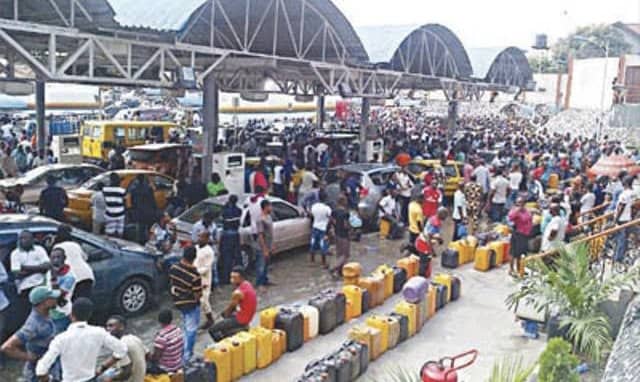Residents of Kogi State voiced their deep concerns and frustration on Wednesday over the recent hike in Premium Motor Spirit, PMS, prices by the Nigerian National Petroleum Company Limited, NNPCL,.
In Lokoja, civil activists, academics, civil servants, traders, and artisans expressed their discontent, calling the increase both unwarranted and unfortunate.
The NNPCL raised the price on Tuesday, prompting a swift adjustment by filling stations nationwide.
According to News Agency of Nigeria, a survey in Lokoja showed that all NNPC stations were selling PMS at N897 per litre, up from the previous N617. Independent marketers, including A.A. Rano, Shafa, Always, Bakka Oil, and Masters Energy, were charging between N950 and N1,000 per litre.
Prof. Alewo Johnson-Akubo, Vice Chancellor of Salem University Lokoja, criticized the government for not being more attuned to the current economic challenges faced by citizens.
“In my opinion, the federal government and the NNPCL seem indifferent to the suffering of the masses amid the current economic challenges.
“How could any government, aware of the hardships faced by its people, consider adding to their burdens?” he said.
He urged President Bola Tinubu to intervene, appealing for a return to the old prices.
“I implore the President, in his capacity as a father to all, to call NNPCL to order and compel them to revert to the old prices,” he pleaded.
Johnson-Akubo added that Nigerians had been anticipating a decrease in petroleum prices, only to be dismayed by this unexpected and discouraging rise.
Idris Muraina, a civil society member, also voiced his shock and disappointment, describing the price increase as an unwelcome surprise. He questioned how citizens would manage amidst the escalating economic difficulties that have already made life increasingly challenging and unbearable.
“I believe the federal government should demonstrate a greater understanding of the prevailing economic hardships and offer some relief.
“The concern is that prices of nearly every commodity in the country will soar, making basic needs like food and transportation even more difficult to afford,” Mr Muraina said.
He appealed to the president and the All Progressives Congress (APC) government to reconsider the fuel price hike, warning that it would further devastate businesses and livelihoods.
Gloria Ojochegbe, a hair stylist, lamented that she might have to either close her business or raise her service charges further due to the increased cost of fuel.
She said that the removal of fuel subsidy had already reduced customer patronage.
“My business has suffered significantly, which in turn has affected my family’s standard of living,” Ms Ojochegbe said.
She explained that washing and relaxing hair, which used to cost N1,000, now costs N2,000, a price not all her customers can afford.
“I can barely keep my shop running, and I hardly use electrical hair equipment anymore. All I can do is hope for change,” she added.
Bolaji Ajaiyi, a foodstuff retailer, also decried the low patronage, attributing it to the high cost of transportation, which has driven up the prices of foodstuffs and other goods in the state.
“It’s becoming increasingly difficult to run a business in this country. I used to travel to Itobe or Kabba Junction to purchase foodstuffs for less than N1,000, but today, I paid N1,500. If this continues without reversal, I don’t think I can keep my business afloat,” Ms
Ajaiyi said. Rebecca Ameh, a petty trader and civil servant, expressed similar concerns. She noted that since the price increase on Tuesday, the cost of goods she purchased on Wednesday had already risen.
“I couldn’t buy the usual quantities to stock my shop. Additionally, today’s sales were minimal due to the price increases I had to implement.
“If the government doesn’t take swift action to address this issue, I doubt people will be able to afford three square meals a day. We have never faced such hardship,” she said.


